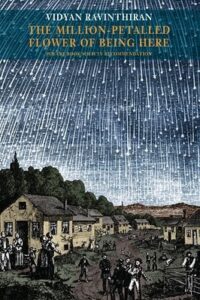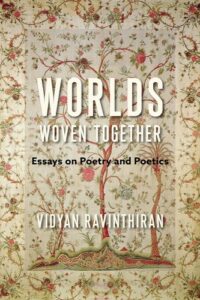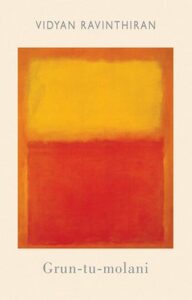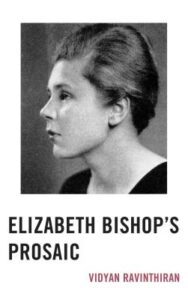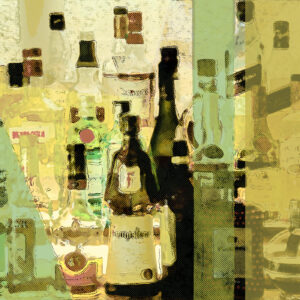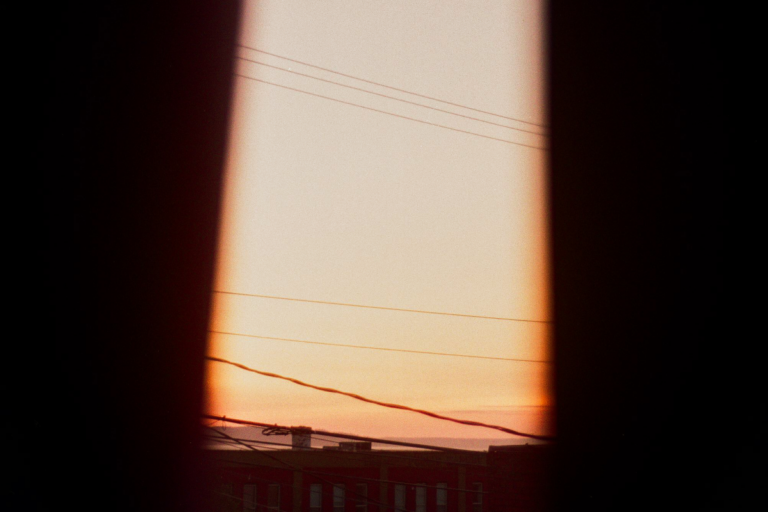Vidyan Ravinthiran
Artist
What self-consciousnesses do artists carry? It can be difficult to know how to hold onto confidence in your work, especially when small jibes from others remain long after apologies have been offered. Art compels and calls, and also complicates.
We’re pleased to offer Vidyan Ravinthiran’s poem, and invite you to connect with Poetry Unbound throughout this season.

Image by Annisa Hale/ Film processed by Moody's Film Lab, © All Rights Reserved.
Guest
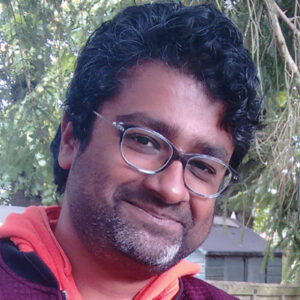
Vidyan Ravinthiran was born in Leeds to Sri Lankan Tamils. His first book of poems, Grun-tu-molani (Bloodaxe Books, 2014), was shortlisted for the Forward Prize for Best First Collection, the Seamus Heaney Centre Poetry Prize, and the Michael Murphy Memorial Prize. His second, The Million-petalled Flower of Being Here (Bloodaxe Books, 2019), won a Northern Writers Award and a Poetry Book Society Recommendation. It was shortlisted for the 2019 Forward Prize for Best Collection, the 2019 T.S. Eliot Prize, and the 2021 Ledbury Munthe Poetry Prize for Second Collections. He is the author of Elizabeth Bishop's Prosaic (Bucknell, 2015); a collection of essays, Worlds Woven Together (Columbia University Press, 2022); a critical study, Spontaneity and Form in Modern Prose (OUP, 2020); and Asian/Other, a fusion of poetry criticism and memoir forthcoming from Icon in the U.K. and Norton in the U.S. Ravinthiran is an associate professor of English at Harvard University.
Transcript
Transcription by Alletta Cooper
[music: “Praise the Rain” by Gautam Srikishan]
Pádraig Ó Tuama: My name is Pádraig Ó Tuama, and I’ve loved poetry my whole life. And I recognize that for some other poets, they might look at that and think, “Oh God, that makes you a proper poet, and I feel like I’ve come late to poetry.” But I also have been somebody who’s compared myself to people for a long time. And comparison really can be the seat of death for artists. I really like looking at what it is I can learn from other pieces of art. But comparing and thinking that something is going to take away my voice can — it can really undo you. I’ve met so many people and I’m part of the community where I have to develop a relationship with comparison and a relationship with criticism, too, that might move me forward rather than stopping me.
“Artist” by Vidyan Ravinthiran
“When you were young you’d draw and paint.
Then your brother said all you could do
was copy down what was in front of you.
So you stopped. Sometimes you start again.
He’s bought you watercolours. He is a saint
but what’s done is done. I don’t,
for more than a rearriving moment,
understand. For his role in your family was mine
in mine. How could I never learn,
till watching you, what sketching means:
touching with your eyes what has been given
again, and again, and again. It’s the way you were raised.
The way you were erased. But I envy your line
that self-forgetful vigilance – its hesitation, even.”
[music: “Ice Tumbler” by Blue Dot Sessions]
This poem, “Artist,” is towards the end of Vidyan Ravinthiran’s book, The Million-petalled Flower of Being Here. And it’s a book composed entirely of sonnets. There’s two sonnets per page, and they’re all addressed to his wife. This one comes towards the end, and I love it.
There’s such attention. He is addressing a period of time where he didn’t know his wife. “When you were young you’d draw and paint.” And there’s this presence of the brother, and he associates himself with the brother. The “brother said all you could do / was copy down what was in front of you.” Was that the brother saying, you know, that’s what you should do, so you shouldn’t be doing your own private and imaginative compositions, or is it the brother saying, “Oh, you’re only able to copy, you know, you’re not able to do anything original.”
One way or another, the burden of what the brother said seems to have weighed on her. “So you stopped. Sometimes you start again.” There’s this sense that somebody is feeling like their artistic capacity was dampened.
What’s clever about this poem is that it doesn’t make the brother into the bastard brother who took away your artistic interest, and I really appreciate that about the poem. Because it would be easy to turn this into a certain kind of hyperbolic drama. “He [is] a saint / but what’s done is done.” And then later on, a couple of lines later on, Vidyan Ravinthiran says, “For his role in your family was mine / in mine.” There’s a sense about gendered relations present in the poem. Who is it that gets to give a final or authoritative word about the talents of other people in a family? What’s the role of eldership that’s happening, perhaps? What’s the role of risk about having an artist in the family? And also, then, for anybody who’s heard something like that — that has felt like it’s compressed part of their life, part of their artistic talent — what is your relationship with that?
[music: “Minutes Past” by Blue Dot Sessions]
When I prepare a poem for Poetry Unbound, I often write it out, sometimes longhand, and always typing as well. And twice when I wrote this poem out, I made a spelling mistake in the first line. The first line is: “When you were young you’d draw and paint.” But I twice wrote, “When you were young you’d draw and pain.” And then I went onto the other lines. And what’s interesting is that the word “pain” is hidden in the word “paint.”
And I see that that’s part of what this poem is doing, is looking at how, for this particular character, Vidyan Ravinthiran’s wife, that painting and pain have a shared ground. The desire to be good at something, also, the desire for self-expression at something, whether or not you ever become known for it. That that always carries within it a kernel — pain is present in paint — it carries a kernel for how it is your sensitivity is raised, and how much harm can be done by yourself to yourself by choosing to remember the things that are said to you.
Sometimes those things are said in cruelty by somebody who really, really wants you to feel the shame that they’re trying to heap upon you. But the brother in this poem, I don’t think he does. Because there’s this lovely line, “He’s bought you watercolours. He is a saint / but what’s done is done.” Certainly, it doesn’t seem like there’s been an estrangement, but the estrangement has been between the painter and the painting.
And Vidyan Ravinthiran is looking at how, in the presence of that pain, nonetheless, his wife keeps on coming back and she keeps on painting. And he is envious, he says, towards the end of the poem: “But I envy your line / that self-forgetful vigilance – its hesitation, even.” And the hesitation might be part of the remembering of, oh, about copying or technique or whatever burden it was that that early instance of something said by the brother had heaped upon her, but she keeps on doing it. And that surely is the call that she’s been called into. And that, in a terrible way, that somehow the pain of that memory of those early words has given her vigilance towards something that she wants to continue to put herself back into.
[music: “First Grief, First Air” by Gautam Srikishan]
Sometimes I think it’s difficult to be alive. In the tender parts of our life, somebody says something about what they love in the world: I want to be a dancer, I want to be a poet, I want to be a painter. Some desire to create. By putting that out there, you are giving it out there in a way that it can be easily crushed. Maybe by somebody who wants to crush it, or maybe by somebody who just wants to say, “Oh, you’ve got other talents,” or, “Oh, I know somebody who tried that and it failed,” or, “Oh, there’s no money in that.” All the kind of ways where, either with nonchalance or with something dressed up as concern, people say things that can really crush you.
And this is a poem that holds together a time, a memory that continues to persist. “What’s done is done.” That’s a tough line to look at. I think of things that I might have said to other people thinking, “God, I wish I could take that away, forget it, say, ‘Let’s start again.’” But what it’s saying here is that a person who has heard something that has given them a necessary pain at the heart of their art will continue to hold onto that necessary pain throughout time. And the question is how can they attend to their art through the aperture of that pain and perhaps allow the aperture of that pain to be part of their art?
[music: “Memoriam” by Gautam Srikishan]
This sonnet by Vidyan Ravinthiran starts off with really strong formal rhyme: paint and again, do and you, don’t / moment. So for the first eight lines, there’s what looks like a relatively normal sonnet rhyming sequence. But what’s so interesting is that for the next six lines, it breaks and it moves from being end-line rhymes into something that begins to use repetition. “His role in your family was mine / in mine.” “What [has] been given / again, and again, and again.” “The way you were.” “The way you were.” And then there’s “raised” and “erased.”
And I love the way that this sonnet starts off with a very particular formality that almost makes me think of the classic sonnets that I’d just studied in school, Petrarchan or Shakespearean sonnets. But then it changes it and it modifies it, and it allows the repetition of things to be present. And in a poem about somebody repeating words that might have been painful to them — nonchalant words that they find it hard to disremember — in a poem about that, I think it’s so powerful that the second part of the poem has all of these echoes of repetition that is telling us: here’s what it’s like to have to live in relationship with words that you wish you didn’t have to live in relationship with. And my guess is the brother wishes she didn’t have to live in relationship with either.
The poem is titled “Artist,” though. And in that way, I think of the authority of the title of the poem, because so often what people worry about, I think, is: “Am I or am I not an artist?” or “Who recognizes me?” And the poem is about being seen in self-forgetful vigilant artistry. So in the presence of all of this, and in the presence of repeated time, the poem is giving a title, which is one that’s well deserved, I think, from a life of study, a life of being an artist, a life of lines.
[music: “The Edge of All There Is” by Gautam Srikishan]
“Artist” by Vidyan Ravinthiran
“When you were young you’d draw and paint.
Then your brother said all you could do
was copy down what was in front of you.
So you stopped. Sometimes you start again.
He’s bought you watercolours. He is a saint
but what’s done is done. I don’t,
for more than a rearriving moment,
understand. For his role in your family was mine
in mine. How could I never learn,
till watching you, what sketching means:
touching with your eyes what has been given
again, and again, and again. It’s the way you were raised.
The way you were erased. But I envy your line
that self-forgetful vigilance – its hesitation, even.”
[music: “Praise the Rain” by Gautam Srikishan]
Chris Heagle: “Artist” comes from Vidyan Ravinthiran’s book The Million-petalled Flower of Being Here. Thank you to Bloodaxe Books who gave us permission to use Vidyan’s poem. Read it on our website at onbeing.org.
[music: “Praise the Rain” by Gautam Srikishan]
Poetry Unbound is: Gautam Srikishan, Eddie Gonzalez, Lilian Vo, Lucas Johnson, Amy Chatelaine, Kayla Edwards, Annisa Hale, and me, Chris Heagle.
Our music is composed and provided by Gautam Srikishan and Blue Dot Sessions.
This podcast is produced by On Being Studios, which is located on Dakota land. Open your world to poetry with us by subscribing to our Substack newsletter. You may also enjoy Pádraig’s new book, Poetry Unbound: 50 Poems to Open Your World. For links and to find out more visit poetryunbound.org.
Books & Music
Recommended Reading
The On Being Project is an affiliate partner of Bookshop.org and Amazon.com. Any earnings we receive through these affiliate partnerships go into directly supporting The On Being Project.





